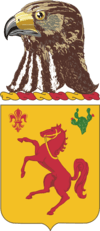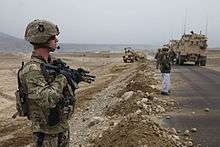113th Cavalry Regiment
The 113th Cavalry Regiment is a cavalry regiment originating as an Iowa National Guard unit with history tracing back to the 19th century Indian Wars.
| 113th Cavalry | |
|---|---|
 Coat of arms | |
| Active | 1921–1950 1992 – present |
| Country | |
| Branch | |
| Type | Mechanized Cavalry |
| Garrison/HQ | Camp Dodge, Iowa |
| Nickname(s) | Red Horse Squadron |
| Motto(s) | We Maintain |
| Colors | Red, Yellow |
| Engagements | World War II: Normandy, Northern France, Rhineland, Germany War on Terror: Afghanistan |
| Commanders | |
| Current commander | Lieutenant Colonel Jason Kneuven |
| Notable commanders | Colonel William S. Biddle, MG Timothy E. Orr |
U.S. Cavalry Regiments | |
|---|---|
| Previous | Next |
| 112th Cavalry Regiment | 126th Cavalry Regiment |
It was heavily involved in fighting during World War II against German forces in France, Belgium, Holland and Germany from June 1944 - May 1945.[1] Following a long period of inactivation after World War II, one squadron of the 113th Cavalry was reactivated in 1992. Since being reactivated, the 1st Squadron of the 113th Cavalry Regiment (part of the 2nd Brigade Combat Team, 34th Infantry Division) has conducted peace keeping operations in Kosovo, as well as combat deployments during Operation Iraqi Freedom, and Operation Enduring Freedom.
History
Iowa had organized the 1st (Iowa) Cavalry Squadron in 1915,[2] a unit with four troops (companies) and which had seen service on the Mexican frontier during the pursuit of Pancho Villa. After World War I, the 113th Cavalry was constituted in 1921 as part of the Iowa National Guard and subordinated to the 24th Cavalry Division. The regiment participated in riot control duties during the Cow War in Iowa in 1931, and elements of the regiment suppressed labor unrest in Newton, Iowa, in 1938. The regiment was relieved from assignment to the 24th Cavalry Division in September 1940, inducted into federal service on 13 January 1941, and moved to Camp Bowie, Texas, on 25 January 1941.[3]
The 113th Cavalry Regiment (Horse-Mechanized) sailed to England, arriving on 28 January 1944. In England, the regiment was converted to the 113th Cavalry Group (Mechanized), with the 1st Squadron becoming the 113th Cavalry Squadron (Mechanized) and the 2nd Squadron becoming the 125th Cavalry Squadron (Mechanized), both subordinated to the 113th Cavalry Group. Subsequently, the 113th Cavalry Group served as the mechanized cavalry group for the U.S. XIX Corps, fighting in Normandy, the Netherlands and the conquest of Germany.[4] The 113th Cavalry Group returned to the New York port of entry on 25 October 1945 and was inactivated at Camp Shanks, New York, on 26 October 1945.[5]


The 1st Squadron, 113th Cavalry was reactivated on 11 September 1992, at ceremonies at Camp Dodge, Iowa, from former elements of the 194th Cavalry. In 1996 the squadron was restructured for the next ten years with the Headquarters and Headquarters Troop (HHT) at Sioux City, Iowa, Troops A and B at Camp Dodge, Troop C at Le Mars, and Troops D, E and later an F at Waterloo. With the next reorganization, Troops D, E and F were detached when the 1-113th Cavalry reorganized into a RSTA (Cavalry) and became an organic asset to the 2d Brigade Combat Team, 34th Infantry Division. It remains an active duty unit of the Iowa National Guard.
There are three troops that comprise the 1-113th Cavalry and one support unit along with a Headquarters Troop. Troops A and B drill at Camp Dodge, Iowa, and Troop C is headquartered in Le Mars, Iowa. The support unit, Company D, 334th Brigade Support Battalion (BSB), trains in Sioux City, along with the HHT, as well as a detachment from 2168th Transportation Company (TC). Troop C returned from Iraq in October 2006. Troop A deployed in June 2007, and the squadron as a whole, including Company D, 334th BSB, and the 2168th Transportation Company, deployed in November 2010 with the 2d Brigade Combat Team as part of Operation Enduring Freedom.
Awards and Decorations
Campaign credit
| Conflict | Unit | Streamer | Notes |
|---|---|---|---|
| World War I | Squadron | Without Inscription | |
| World War II | Squadron | Normandy | |
| World War II | Squadron | Northern France | |
| World War II | Squadron | The Rhineland | |
| World War II | Squadron | Central Europe | |
| World War II | HHT & C Troop | None | |
| World War II | HHT & C Troop | None | |
| World War II | HHT & C Troop | None | |
| World War II | HHT & C Troop | None | |
| World War II | HHT & C Troop | None | |
| World War II | HHT & C Troop | None | |
| GWOT | Squadron | Operation Enduring Freedom CONSOLIDATION III 2009-2011 | |
| GWOT | A Troop | Iraqi Surge | |
| GWOT | C Troop | Iraqi Governance | |
| GWOT | C Troop | National Governance |
Unit Decorations
| Unit | Streamer | Year | Notes |
|---|---|---|---|
| Squadron | Meritorious Unit Commendation Streamer embroidered Afghanistan 2010-2011 | None | |
| Squadron | Superior Unit Award | 2008 | |
| A Troop | Meritorious Unit Commendation Streamer embroidered Iraq AUG 2007- APR 2008 | None | |
| C Troop | Meritorious Unit Commendation Streamer embroidered Iraq 2005-2006 | None | |
| HHT & C Troop | French Croix de Guerre with Palm, World War II, Streamer embroidered BELVEDERE | None | |
| Group | Belgian Fourragere Croix de Guerre 1940 -1945 | 1947 |
See also
References
- Stephen Hart (2001). The Battle of the Hedgerows: June–July 1944. Zenith Imprint. p. 145. ISBN 0-7603-1166-8.
- "Iowa NG history". Archived from the original on 16 November 2010. Retrieved 23 January 2011.
- Steven E. Clay, U.S. Army Order of Battle 1919 - 1941, Volume 2, p. 635, Fort Leavenworth: Combat Studies Institute Press.
- 113th Cavalry Group page
- Shelby Stanton, World War II Order of Battle, New York:Galahad Books, 1991.